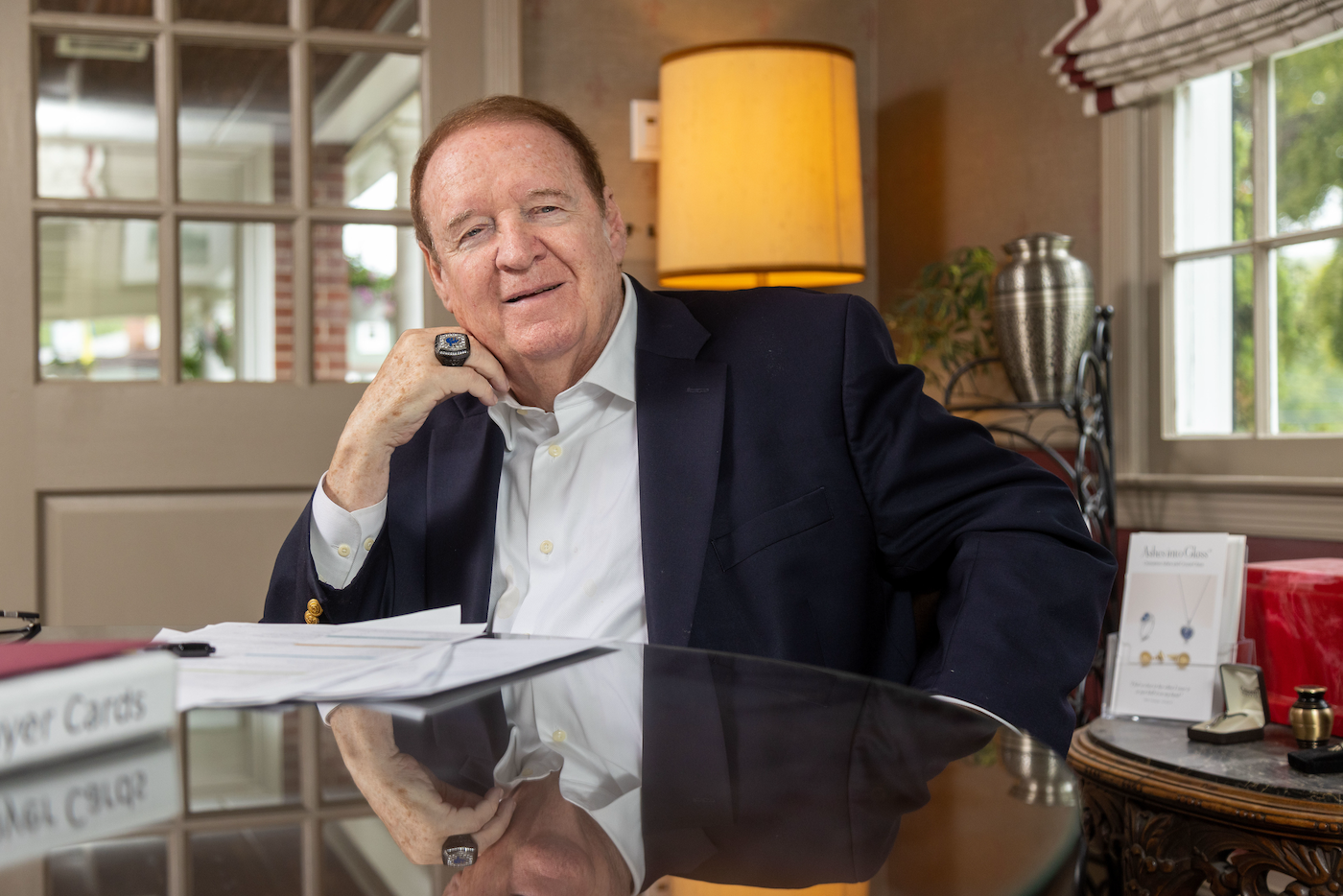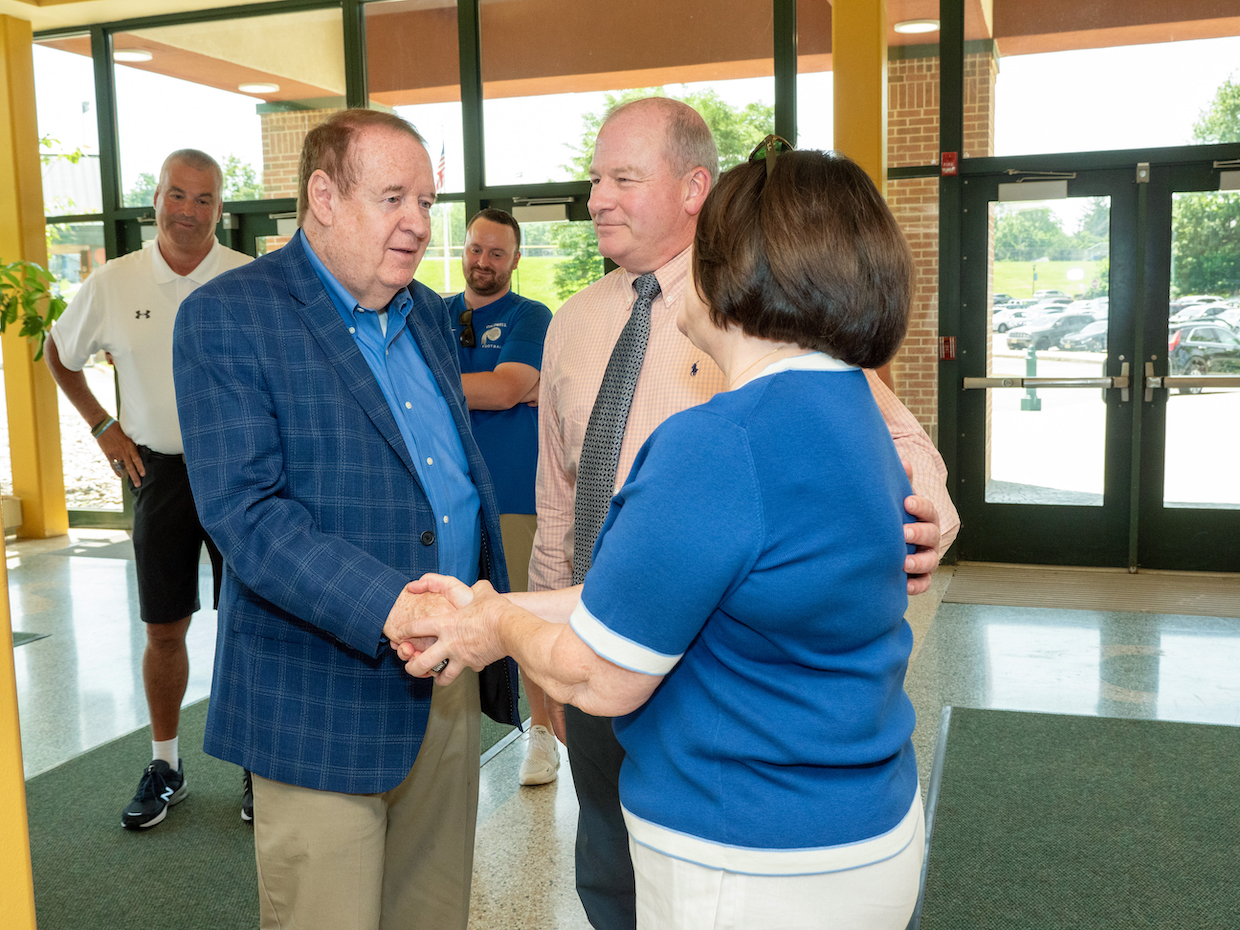When the James Caldwell High School football team won a state championship in 2021, Codey stepped in and bought the team championship rings.
Governor. Coach. Dream maker. Codey is all that and more for people and not about to start slowing down
When you think of Richard Codey, you probably think of laws passed, deals brokered, aisles crossed. You think about his tireless work during his stints as governor, championing stem cell research, funding mental health services, passing an indoor smoking ban for all state buildings, and of course securing the MetLife deal that kept the Giants and Jets in the Garden State.
You probably don’t think about Jessica Riley, or Josh Chery, or countless others Codey has slipped a check to, bought a meal for or shaved the price of a proper funeral for. You don’t think about a man in his eighth decade running from the Statehouse or one of his two funeral homes to coach a traveling youth basketball team, as he’s done for more than 50 years.
You don’t think about the lives he’s altered. Over and over and over again.
This is Dick Codey in his essence.
For him, a bleeding heart is not a derisive phrase, but a way of life.
``Governor Codey changed my life and made so many things possible for me,’’ says Riley, a 19-year-old nursing student whom Codey helped get life-changing surgery two years ago. ``For that I will always be immensely grateful.’’
``I try to call maybe once every two weeks or once a month or so, just to make sure he's OK,’’ says Chery, 25, who first met Codey as a 10-year-old basketball player. ``Because honestly, he definitely changed the course of my life. And I'm forever grateful for that.’’
Codey entered politics at a young age, serving as a state Assemblyman at 27, and since 1982 as a state senator -- the longest-serving state legislator in New Jersey history. He became Senate president in 2002 and filled in as acting governor. Then, when Governor James E. McGreevey resigned from office on November 15, 2004, he served as New Jersey’s governor for the next 14 months before returning to the Senate, where he remains.

Over his 50 years of service, he has been different things to different folks, but the one constant is the people. To the residents and taxpayers of New Jersey, he is a selfless servant of the people, a man once described in a New York Times profile as ``a dealmaker who gets along well with his colleagues … preferring back-room negotiations to mission statements or grand gestures.’’
Those negotiations have produced myriad public health triumphs, most notably increased funding for stem cell research and mental health care. His first official act as governor was to establish a Task Force on Mental Health, which led to a dramatic improvement in the state’s health system. He signed legislation that required GPS tracking for sex offenders and authored laws aimed at cracking down on internet predators. He has championed measures to provide affordable and accessible health care, which includes a prescription drug assistance program for seniors. He also has championed gun control laws, increased to 21 the age to legally purchase tobacco, signed the landmark Smoke Free Air Act into law and initiated drug and steroid testing for high school athletes in New Jersey.
Outside of the Statehouse, he has been the warm and understanding presence that provides consolation and grounding for grieving family members arranging the funeral of a loved one. It is in this environment that Dick Codey parks that 100-mile-an-hour life of his and listens, asks questions and sometimes even shares a smile or laugh.
``He tries to draw them out,’’ says Kelly Carey, an administrator at Codey & Mackey Funeral Home in Boonton and Codey Funeral Home in Caldwell. ``He tries to have them talk about their loved one or even themselves. He’s has a lot of life experiences and he’s got a million ways of connecting with people, too, to make them more at ease. And, well — he’s just really nice.’’
For the past five decades, Codey has coached countless youth travel basketball teams, mentoring players who have gone on to college and professional success — Kyrie Irving among them — and those whose careers stopped at graduation.
He considers them all his players, and that feeling is mutual.
``I mean, it's crazy that he's still doing this even today, still coaching and running around with all these young kids,’’ says Chery. ``I don't know how he does it. I don’t know how he finds time for it. Also, that's also another thing I realized when I got older. He's a busy, busy man. Yet he’s still making time to coach and teach kids basketball, and teaching them to become young men in the world as well.’’
Growing up in West Orange as the son of Haitian immigrants, Chery was able to attend the private Montclair Kimberley Academy for high school with Codey’s help. His basketball career took him to Amherst College, but it was the friendships and associations he made in high school, which he says opened him to career possibilities he would not have considered.
Today he works for Live Nation, staging and promoting concerts in Latin America. ``He helped me get this job,’’ says Chery. ``Besides my parents, he is the most influential person in my life. He changed my life’s trajectory.’’
More dramatically, he did the same for Riley.
Suffering since 14 from severe scoliosis that made even walking painful, Riley felt options slipping away from her. By 16, her participation in high school activities was significantly limited.
And her dream to be a nurse? Given that nurses are on their feet all day, the goal wasn’t simply limited. It seemed impossible. At least without a new form of surgery that the family’s health insurance would not cover.
Seeking to raise $50,000-plus for the surgery, her mother, Melissa, started a GoFundMe campaign. About the same time, August 2021, Melissa’s father, James Post, stopped by a Sussex County luncheonette to see his state senator and a colleague who were there to help local businesses that had been hit hard by the pandemic. Post thought he’d meet his senator, explain his granddaughter’s situation and seek help. But when Post walked in, he learned his senator had left 15 minutes earlier. But the other senator, the one from District 27 in Essex and Morris counties, was still there.
Post approached Codey, who immediately thanked him for his military service—Post was wearing his veteran’s hat. Soon the two men were deep in conversation, and Codey learned a little about Jessica. Before they parted, Codey took out his personal checkbook and donated $2,000 to the GoFundMe campaign. He took Melissa’s number and called her from his office a few hours later.
``I explained the situation further, told him the surgeon's name, told him the hospital,’’ says Melissa. ``And he said, `I know the president of that hospital. We play golf together. Let me see what I can do.’ ’’
What they did was broker a deal: The insurance company agreed to pick up the bulk of the hospital stay (about $140,000); the GoFundMe account and money raised by Codey himself would cover the $50,000 surgeon’s fee.
The last $8,000? Another personal check from Codey.
Today Jessica Riley is an honors student finishing her first year of nursing school at Ramapo College. She hopes to someday work in the same pediatric intensive care unit where she recovered from her own surgery.
``I have wanted to be a nurse in order to help people for a while, but I knew for sure I was on the right path after my time in the hospital,’’ says Jessica. ``Going through my surgery has definitely created a more impassioned commitment to the profession. My recovery in the hospital was the hardest thing I ever went through, but without the amazing nurses it would have been a million times worse. The way they cared for me; I knew I wanted to do that for other people.
``I am so thankful for Governor Codey. Without him I would have never been in the place I am today. His help and selflessness truly changed my life and enabled me to follow my dreams.’’




